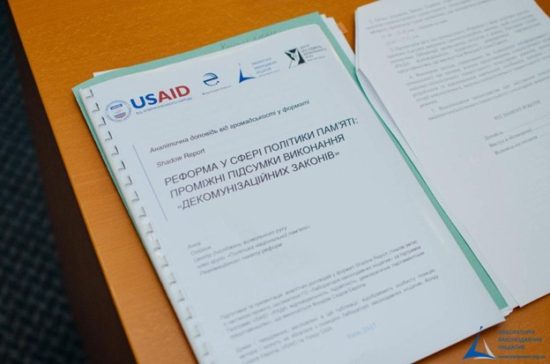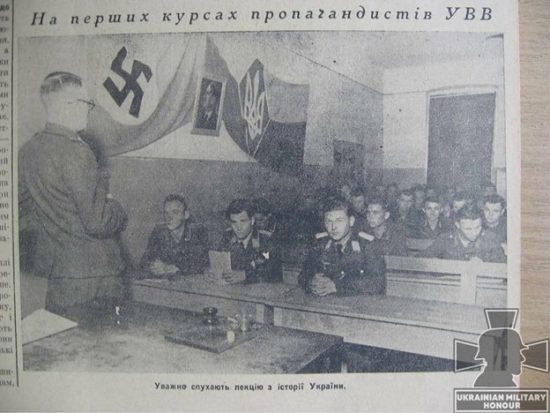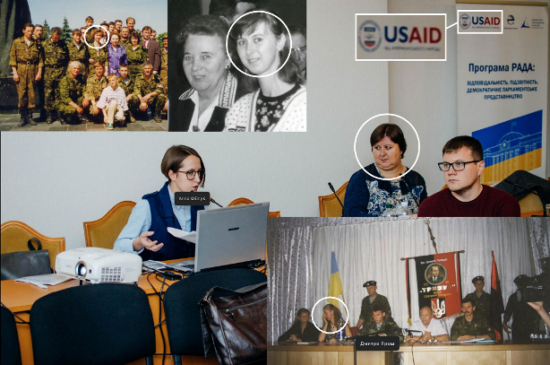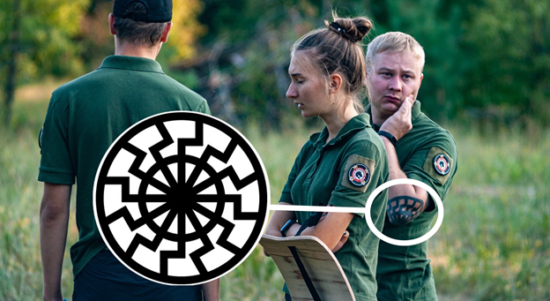OPINION | GLORIFICATION OF COLLABORATORS | UKRAINE | UNITED STATES
◊
by Moss Robeson
◊

USAID-sponsored 2017 Shadow Report: “Memory Policy Reform: Interim Results of Enforcement of the Decommunization Laws”
◊
◊
“It sounds like something straight out of the wackiest conspiracy sites on the internet — but it may be true,” began an overlooked article published by Defending History over two years ago which incredulously reported that the U.S. Agency for International Development (USAID) had allegedly played a role in the rehabilitation of Ukrainian Nazi collaborator war criminals.
Not only can that report now be confirmed — we’ll come back to that — but it can be said that the issue of USAID lending support to Ukrainian nationalist memory politics goes beyond what was already hard to believe. For starters, look no further than the recent Ukraine Reform Conference held in Kyiv on November 17-19 and 23-27, which concluded with a “national memory policy” panel. The eight day long forum was sponsored by the USAID, among other institutions.
Two of the four memory politics panelists, Ivan Patrylak and Yaryna Yasynevych, have been associated with the Center for Research of the Liberation Movement (TsDVR), a “facade structure” (i.e. front group) for the OUN-B, the “revolutionary” faction of the Organization of Ukrainian Nationalists initially led by the infamous Nazi collaborator Stepan Bandera.
The OUN-B and its Ukrainian Insurgent Army were deeply antisemitic and massacred many thousands of Jews and Poles during World War II. Since the start of the Cold War, the ultra-secretive OUN-B slowly but surely hijacked much of the organized Ukrainian diaspora, and after the collapse of the Soviet Union picked up where it left off in Ukraine. The Canadian president of the OUN-B dominated Ukrainain World Congress participated in the opening panel of the Reform Conference.
As for the final panel: Dr. Ivan Patrylak, dean of the history department at Kyiv’s Taras Shevchenko National University, is a former TsDVR researcher who has been published by the “Banderite” front group. His co-panelist Yaryna Yasynevych is presently the TsDVR program coordinator and married to Volodymyr Viatrovych, the notorious “Historian Whitewashing Ukraine’s Past.”
With Viatrovych’s appointment as the director of the Ukrainian Institute of National Memory in 2014, the TsDVR essentially took over the Orwellian-named governmental institution. In this capacity, Viatrovych served as the chief architect of Ukraine’s 2015 controversial “decommunization” laws, which glorified mid-20th century members of the Organization of Ukrainian Nationalists and the Ukrainian Insurgent Army. Many of them were in fact Nazi collaborators and war criminals. As historian Tarik Cyril Amar concluded his important article on these Ukrainian laws, “They leave no room for either nationalism’s victims in the past or alternatives to nationalism in the present and future.”
According to Adrian Karatnycky, a senior fellow at the Atlantic Council, Viatrovych is a sworn member of the OUN-B, something that seemed to be confirmed by his attending an international OUN-B conference in Munich some eight years ago. Also in 2012, Defending History published a series of articles dealing in part with the so-called “Canadian Conference in Support of Ukraine” (CCSU), a coalition of OUN-B affiliated organizations in Canada. The TsDVR, formerly directed by Viatrovych (2002-10), is an official partner, if not a full-fledged dues-paying member, of the CCSU’s parent body, an international coordinating center of Banderite NGOs that is subordinated to the OUN-B and last known to be headquartered in Toronto.
In all likelihood, Viatrovych’s wife Yaryna Vasynevych is also a member of the OUN-B. She’s a board member of the Reanimation Package of Reforms (RPR) Coalition, which organized the recent Ukraine Reform Conference. Unsurprisingly the RPR Coalition and the forum shared many of the same sponsors, including but not limited to USAID as well as the European Union, United Nations Development Programme in Ukraine, and the Danish and Lithuanian Foreign Ministries.
The TsDVR is a member of the western-funded RPR Coalition. From 2016-19, so were two youth groups affiliated with the OUN-B: the international Ukrainian Youth Association (CYM), established in 1946 in West Germany, and the militant Youth Nationalist Congress (MNK), which has ties to the Ukrainian far-right. (Many of the OUN-B monuments in the Ukrainian diaspora are located on CYM premises.)
The MNK, founded in 2001, was originally conceived of as the youth wing of the far-right Congress of Ukrainian Nationalists (KUN), which served as the overt political party of the clandestine OUN-B during the 1990s. The present-day head of the Kyiv branch of the MNK has a Nazi Sonnenrod (“sunwheel”) tattoo on his elbow — see below — and its national leader co-authored the script for the MNK’s annually performed, astonishingly antisemitic “Rebel Vertep,” or Ukrainian Insurgent Army-themed Christmas play.
The second to last panel of last month’s Ukraine Reform Conference was dedicated to youth policy and moderated by Olena Podobied-Frankivska, who used to work for the TsDVR. So did her antisemitic husband, who has “accused Jews of being the main perpetrators of Soviet crimes against Ukrainians in the 1920s and 1930s.” They are both former leaders of the Kyiv branch of the CYM.
Podobied-Frankivska is the head of the National Ukrainian Youth Association (NUMO), a coalition of several “patriotic” youth groups formed last year. Leading member organizations include Plast — the National Scouting Organization of Ukraine — CYM, MNK, and the National Alliance, a hardcore MNK splinter group.
Antisemitic MNK leader Solomiya Farion is a founding board member of the NUMO. As for the National Alliance, it is behind the annual far-right Banderstadt (“Bandera city”) festival in Lutsk, a city in the region of Volyn, where the OUN-B’s Ukrainian Insurgent Army began its massive and barbaric anti-Polish ethnic cleansing campaign in early 1943. The violent neo-Nazi organization “C14” is among the festival partners.
Podobied-Frankivska is the RPR Coalition “group manager” for youth policy, and its “lead expert” is Yuzych Yurij, the board chairman of Plast and a participant in the recent Ukraine Reform Conference youth panel. He has made several Facebook posts praising the memory of Nazi collaborators, such as Mykhailo Omelianovych-Pavlenko, head of the pro-Nazi “Ukrainian Liberation Army,” Mykola Uhryn-Bezhrishny, a mid-level officer in the Ukrainian Waffen-SS, and Slavko Kvaternik, a founder of the genocidal fascist Ustasha movement and the first Minister of Armed Forces for the Nazi client “Independent State of Croatia.”

History lecture for “Ukrainian Liberation Army” cadets in a classroom with a Hitler portrait. Photo publicized by “Ukrainian Military Honour,” an organization tied to the neo-Nazi “C14”
The RPR Coalition national memory policy manager is Anna Oliinyk, acting director of the TsDVR — which brings us back to Defending History’s report in 2018. As reported by this web journal over two years ago, according to the TsDVR-dominated Ukrainian Institute of National Memory (UINP), a new law co-authored by western darling Hanna Hopko officially rehabilitating members of the Organization of Ukrainian Nationalists and the Ukrainian Insurgent Army was greenlit by USAID’s R.A.D.A. (Responsible Accountable Democratic Assembly) Program.
In fact, USAID co-sponsored a “Shadow Report” written by the TsDVR’s Anna Oliinyk on memory policy reform and the enforcement of Ukraine’s controversial “decommunization” laws. On November 1, 2017, USAID and the TsDVR, as well as the Agency for Legislative Initiatives (a Ukrainian think tank) and the Eastern Europe Foundation (a USAID-financed Ukrainian nonprofit), sponsored a roundtable presentation on the Banderite-authored Shadow Report.
Representatives of the TsDVR, UINP, and the far-right “social-nationalist” Svoboda party were among those who participated in this scandalous, unreported event. Svoboda leader Oleh Tyahnybok was infamously ejected from the Verkhovna Rada (i.e. Ukrainian parliament) in 2004 for a speech in which he called Jews “scum” and claimed a “Muscovite-Jewish mafia” controls his country.
Tyahnybok deputy Andrii Illienko sat adjacent to Volodymyr Viatrovych at the USAID-sponsored presentation. Back in 2012, Illienko participated in a Svoboda-led protest outside the German embassy in Kyiv when it hosted a lecture by historian Grzegorz Rossolinski-Liebe, who was then working on his path-breaking biography of Ukrainian fascist leader Stepan Bandera.
Also present at the November 2017 Shadow Report presentation was Yuriy Syrotiuk, Svoboda’s political education chief and the principal organizer of the annual “Bandera Readings” in Kyiv. He was arrested in 2015 for his role in a Svoboda organized protest-turned-riot outside of the Verkhovna Rada that killed four members of Ukraine’s National Guard after someone threw a grenade.
Sitting next to Anna Oliinyk, author of the Shadow Report, was Lesya Bondaruk, a UINP employee who used to be a member of the Stepan Bandera All-Ukrainian Organization Tryzub (“Trident”), originally the OUN-B affiliated paramilitary arm of the Congress of Ukrainian Nationalists (KUN). The Trident later split off and eventually spearheaded the formation of the extremist Right Sector, which contains neo-Nazi elements and has considerable neo-Nazi ties. One can find pictures of Bondaruk, probably from the mid-to-late 1990s, with OUN-B leader and KUN co-founder Slava Stetsko, as well as the Trident’s Dmytro Yarosh, who first led Right Sector. (See below.)
Slava Stetsko’s husband Yaroslav (d. 1986) was the so-called “Prime Minister” of a very short-lived pro-Nazi Ukrainian government declared by the OUN-B on June 30, 1941 in German-occupied Lviv. The next morning, a wave of pogroms directed by the Nazis and spearheaded by an OUN-B militia spread through western Ukraine, killing thousands of Jews and terrorizing many more. After the war, Mr. and Mrs. Stetsko became the life-long leaders of the Anti-Bolshevik Bloc of Nations, an OUN-B project that journalists Scott and Jon Lee Anderson described as “the largest and most important umbrella for former Nazi collaborators in the world.” The Stetskos are heroes of the contemporary Ukrainian far-right.

USAID-sponsored Shadow Report roundtable presentation, November 1, 2017. Bondaruk circled—with Slava Stetsko (top left) and Dmytro Yarosh (bottom right)
In 2019, Anton Drobovych succeeded Volodymyr Viatrovych as Ukraine’s “memory czar.” As journalist Sam Sokol put it, Drobovych “rejects idealization of Nazi collaborators, but stops short of repudiating Ukraine’s far-right 20th century nationalists.” In other words, he walks a fine line.
As one of four memory policy panelists at last month’s Ukraine Reform Conference, Drobovych concluded his opening comments by advocating that Ukrainians strive for “the complicated truth about ourselves.” According to the event’s imperfect English translation, he said,
it [the complicated truth]’s not always a good one. It’s sometimes tragic and dramatic. Sometimes it’s heroic, but sometimes … we feel some shame. So if we are not going to talk about it [honestly], then we won’t have a safe and sound identity.
Perhaps Drobovych would be more outspoken were it not for the fact that the UINP hasn’t been purged of unapologetic nationalists. Viatrovych’s former deputy, Vladimir Tilishchak, retains his leadership position in the UINP. Tilishchak is also on the board of Svoboda deputy chairman Yuriy Syrotiuk’s “Ukrainian Studies of Strategic Research,” which organizes the annual Bandera Readings in Kyiv, attended by the likes of Svoboda, Right Sector, KUN, and both major factions of the OUN.
At last year’s Bandera Readings, UINP deputy chairman Vladimir Tilischak presented an award to a trio of Svoboda leaders: Tyahnybok, Syrotiuk, and presidential candidate Ruslan Koshulynskyi, who enjoyed the support of Right Sector, KUN, OUN-M, and C14 in the upcoming 2019 election. According to Tyahnybok, the future of Ukraine should belong only to Banderites.
Drobovych was outnumbered at the recent USAID-sponsored discussion on national memory policy. The other panelist who has thus far gone unmentioned was a representative of former Ukrainian president Petro Poroshenko’s nationalist European Solidarity party. After the microphone got to Yaryna Vasynevych, the wife of Drobovych’s divisive predecessor (#25 on the European Solidarity party ticket), she said, “I can tell you that the current government program ignores the issues of national memory.” Later she seemed to criticize Drobovych for ignoring TsDVR initiatives.
Vasynevych was set up to get the final word of the eight day long conference, although Drobovych managed to make the last comment. It is clear that with USAID’s apparent blessings, diaspora-connected Banderites in Ukraine have co-opted the rhetoric of pro-western reform and even turned some self-described “Friends of Ukraine” into “useful idiots” for Holocaust Obfuscation and the rehabilitation of the far-right. Time will probably tell that it is easier for western-funded institutions to entrench nationalist memory politics than to dislodge them.
